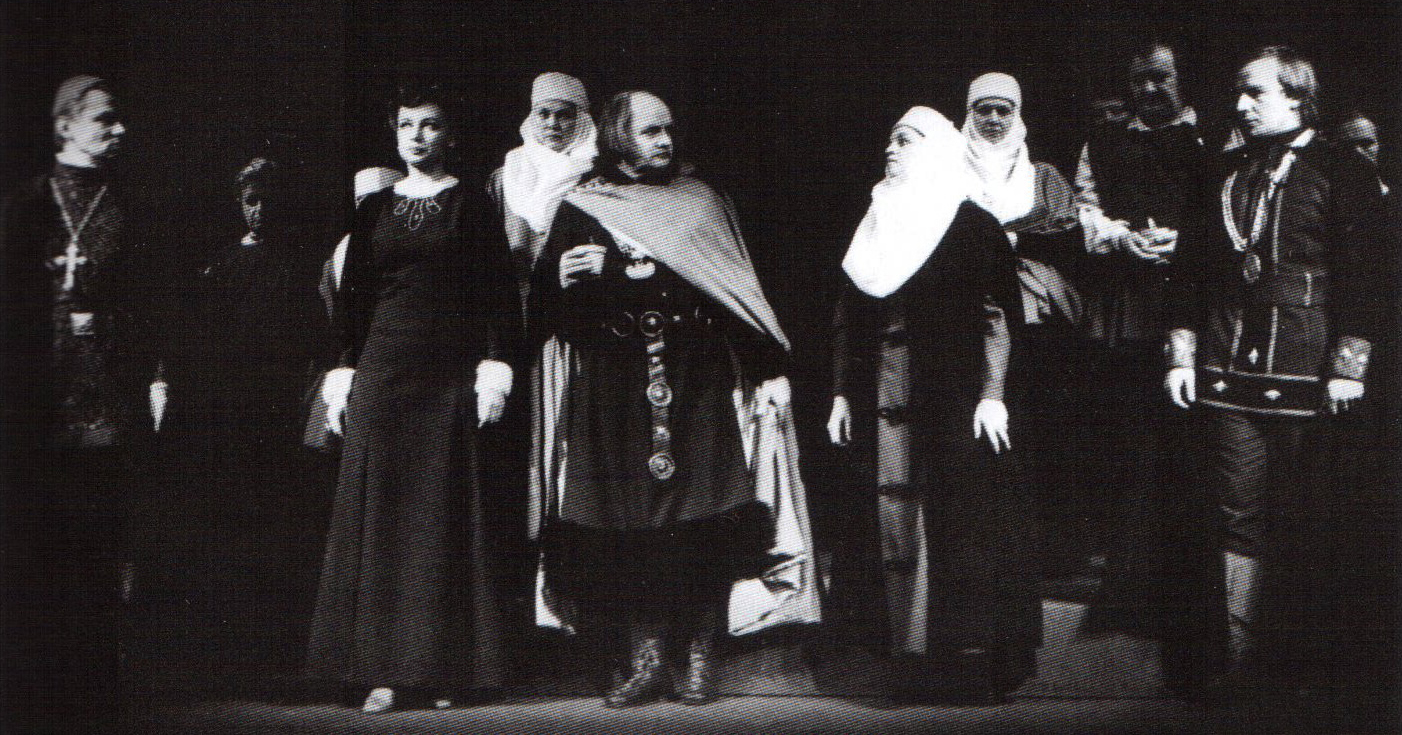Lithuanian theatre found the most fertile "land of hope" in historical poetic drama. The term "theatre of hope" can be applied very broadly. It applies to the intelligent, stylistic theatre of Irena Bučienė and its examination of the "moral value of man" and its defense of "human dignity", Irena Aleksaitė, „Valstybinis akademinis dramos teatras“, in: Lietuvių teatro istorija. Kn. 3: 1970–1980, sudarė Irena Aleksaitė, Vilnius: Kultūros, filosofijos ir meno institutas, 2006, p. 57. and to the comforting productions of Dalia Tamulevičiūtė that sought to unravel the "problems of everyday heros", seeking "to find in that everyday life the seeds of surviving good, beauty and emotional sensitivity", Rasa Vasinauskaitė, „Valstybinis jaunimo teatras“, in: Lietuvių teatro istorija. Kn. 3: 1970-1980, sudarė Irena Aleksaitė, Vilnius: Kultūros, filosofijos ir meno institutas, 2006, p. 107, 120. and also to other events in the Lithuanian theatre of the 1970s that represented an increased moral and psychological sensitivity.
Lithuanian theatre began turning toward historical dramas in the late 1950s, with the first challenges to the canons of domestic socialist realism employing the words of Balys Sruoga, Juozas Grušas and Justinas Marcinkevičius (Fate Before Dawn staged by Romualdas Juknevičius at the Academic Drama Theatre in 1956; Henrikas Vancevičius' production of Herkus Mantas at the Kaunas Drama Theatre in 1957; Kazimiera Kymantaitė's staging of Blood and Ashes at the Academic Drama Theatre in 1961).
Theatre's perseverance to present an elevated and poetic reflection of history noticeably strengthened in the late 1960s and in the 1970s, as works of classical historical drama were presented one after another, in addition to new works by the successors of this tradition: works by Balys Sruoga (The Giant's Shadow at the Klaipėda Drama Theatre, directed by Povilas Gaidys, in 1974, and at the Academic Drama Theatre under the direction of Kazimiera Kymantaitė in 1979; Kazimieras Sapiega at the Academic Drama Theatre directed by Vancevičius in 1979), Vincas Mykolaitis-Putinas (Ruler, Šiauliai Drama Theatre, dir. Aurelija Ragauskaitė, 1974), Vincas Krėvė (Skirgaila, Šiauliai Drama Theatre, dir. Saulius Varnas, 1981), Juozas Grušas (Barbora Radvilaitė, Klaipėda Drama Theatre, dir. Bronius Gražys, 1973; Švitrigaila, Kaunas Drama Theatre, dir. Vytautas Čibiras, 1975) and others.
The most significant place in the field of historicized theatre was occupied by interpretations of a trilogy by Justinas Marcinkevičius, primarily by two uniquely competing versions: one by Henrikas Vancevičius (Mindaugas, in 1969; Cathedral, in 1971 and 1972; Mažvydas, in 1978) and the other under the direction of Povilas Gaidys (Mindaugas, in 1969; Mažvydas, in 1976; Cathedral, in 1980). It was immediately acknowledged that the dramaturgy of Justinas Marcinkevičius had been given different readings, and that an opposition of literary and directorial theatre had been expressed: Vancevičius based his version on the tradition of literary and acting theatre, "displaying and accentuating the heroic origin of romantic theatre," while Gaidys offered a theatrical and interpretative reading of the literary text – "muting its romantic pathos and endowing the deeds and suffering of the hero with 'Freudian' tones" and "taking a step toward the deromanticizing of the romantic tradition." Gražina Mareckaitė, Romantizmo idėjos lietuvių teatre: nuo XIX iki XXI amžiaus, Vilnius: Kultūros, filosofijos ir meno institutas, 2004, p. 157, 158.
More than engaging in a debate with each other, these polemic versions of history challenged the censored reality of the day that had trampled the most basic humanistic values. These interpretations, much like in the historical productions by Jurašas and Vaitkus, used history as an instrument to re-examine the present.
Unlike Jurašas and Vaitkus, however, Vancevičius and Gaidys saw in history not the metaphoric reflection of reality's wounds, but the fountain of spiritual strength and a moral imperative. They did not reject the elevated, poetic spirit of history of Justinas Marcinkevičius nor did they dispel the distinct tone of his words or doubt his proposed ideal of a national hero: a "person who, having found himself in the turmoil of historic events, actively participates in the process of building the nation and feels the tragic weight of that process, but still painstakingly carries out his obligation to society." Jonas Lankutis, Lietuvių dramaturgijos tyrinėjimai, Vilnius: Vaga, 1988, p. 575.
These characters were powerfully interpreted by different but uniformly skilled and riveting actors – first of all Regimantas Adomaitis, who was one of two actors to take on the title role in Vancevičius' production of Mindaugas (the other being Juozas Rygertas), and who was also one of three performers in the lead role of Mažvydas (also played by Henrikas Kurauskas and Laimonas Noreika), as well as Vytautas Paukštė, performing as Mindaugas and Mažvydas in Gaidys' productions.
With the dramas of Justinas Marcinkevičius and retrospectives on history, Lithuanian theatre reinforced its view of poetry as a source of uplifting action, idealistic heros, and the power and solemnity of the poetic word, a concept that had become evident in the late 1950s. This concept and poetic-historic drama in general presented an important opportunity to return to the true values of classical theatre.
Yet the desire of some to return to these values in no way extinguished the desire of others to keep them at a distance. Such was the proclaimed goal of Lithuanian theatre that emphasized the destruction of loftiness and solemnity with humor, playfulness, lighthearted improvisation and similar pursuits.
|
Read more: Lithuanian Dramaturgy in the Soviet Era.
|




Comments
Write a comment